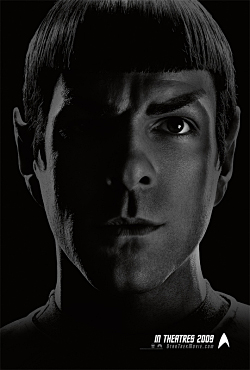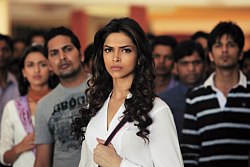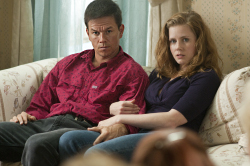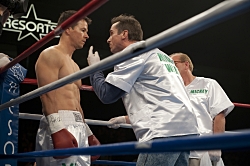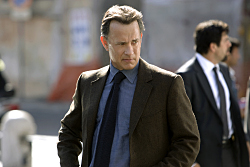If someone has never seen the show before, how would you describe your character of Mr. Spock?
Popular on LondonNet
Spock is half human and half Vulcan, which is the most important distinction about him because those two cultures are in certain ways totally opposed in how they deal with the world. The Vulcan culture at a certain point in its history chose to abandon their connection to deeply felt emotion to employing a system of logic that allowed them to interrelate in a less volatile way. Humans as we know are generally ruled by our emotions. The mixture of the two things is what really defines this character. In this story, he is not as in control of that duality and he is struggling to define who he really is. I am sure many people can relate to that struggle.
That was a great explanation but one must presume knowledge you haven’t always had. How much research did you have to do to really get to know the back-story of this character?
A lot of that was in the script. My big resource was Leonard Nimoy, who made himself available to me. As an actor, I am serving the script and there was a lot of information there. One of the great things about ‘Star Trek’ is that there is no shortage of material on the mythology of the story.
In all of your research, did you come to any understanding why this character has lasted so long in folklore? We have met many characters in film and TV, yet this one has left such an iconic impression.
He strives to be genuine and magnanimous. He has a deep abiding faith in humanity. He believes that good will prevail and he tries to bring that to bear. Also he is constantly internally dealing with things, which is one of the great joys of playing this character. As an actor, I get to have tons of secrets and private opinions. That internal mystery is very magnetizing and I think has a lot to do with what makes him so beloved.
It is amazing that these characters have lasted for over forty years and audiences still hunger for more.
I think what Gene Roddenberry set out to create when he made the original series was almost subversive. He dealt with themes that people had trepidation about openly discussing in the late sixties – like racial, social and political issues. It was ahead of its time in many ways and it sparked an intellectual interest that cultivated the fan base. It is also at its core an optimistic piece. It offers hope and brings people together and encourages them to celebrate a unified spirit.
How aggressive were you in seeking out this part or did they come to you?
To a degree I proactively sought it out. Right at the time I found out that they were making this movie my character was debuting on ‘HEROES’ and so I was doing a lot of interviews. In the very first interview I did for my hometown paper, the journalist asked if there were any other roles in which I was interested. I said, ‘I did hear they are making a new ‘Star Trek’ movie. I would love to play Spock.’ Then that interview got syndicated, and so subsequent interviews started to include journalists inquiring about my interest in the project and eventually saying things like, ‘So we hear your dream role is Spock in the new ‘Star Trek’ movie.’ To which I just started replying, ‘Indeed it is.’ So it really was a surprisingly organic evolution. When casting got up and running, they had read some of those interviews and when they called for material we were able to send them my reel and we were also able to send the press packet where I talked about it.
At what point once you did get cast and they started going through the test, I mean and there were different variations did you look in the mirror and go oh my God?
The tests happened in stages. I mean it was certainly a momentous occasion when I put the ears on for the first time and then when I shaved my eyebrows that sort of added to the situation, and then when I got my hair cut, you know, it all sort of slowly came into place. And there was one day when we did full wardrobe and makeup, hair test that it became clear that this was actually happening.
Did you watch a lot of the episodes from the old series?
No, I did not watch any of the episodes before we started shooting… well, that’s not true actually. I watched two episodes with Leonard early on – but other than that I really focused on my relationship with him in preparation and my own research and reading. It was made very clear from the beginning that JJ was not interested in us trying to recreate what the original cast did, but rather in us bringing our own perspectives to these characters and the situations in which they happen to find themselves. So for me it wasn’t about copying that at all, what I did was started to watch the original series in my trailer when we were shooting the movie just as a sort of reminder of what we were a part of. I really prepared in a number of different ways.
How was it wearing the ears?
Once they were on they were no problem at all. I honestly didn’t even know that they were there. It was getting them on in the morning that could be tedious just because it required me to show up to work two hours before anybody else. But the one thing I didn’t really anticipate through this process was how impactful the physical alterations would be on my personal life. Having no eyebrows and having to shave everyday and having my hair in this sort of horrible bowl style really alienated me from myself and alienated me from other people. I tended to isolate a lot more during the process of this film – and I think it actually served my relationship to the character because that kind of alienation is something that he struggles with greatly in his life – particularly in this film.
Were you able to still have a personal life looking like that?
As best I could, you know, my idea of a personal life shifted a little bit, you know, I was much more interested in solitude and I withdrew to a certain extent just because I felt like I was working on staying connected to that character and making sure that connection sustained the entire length of the shoot. But as we finished it felt quite like a sort of awakening. An emergence from something – and I started hanging out more and going out more and just having a good time, so it was a definite marked difference.
Did Leonard give you many tips?
Yes. Leonard was very available to me through this process and I have a tremendous respect and affinity for him on many, many levels. More then just giving me tips about this character and what this character means to him and what the experience was, I feel like we’ve become friends. And that to me is something that means a great deal.
Do you recall your first encounter with Mr. Nimoy?
The first encounter with him was in an elevator in San Diego when we both traveled down there to announce that I would be playing the role. It was a pretty cramped elevator and we hadn’t been formally introduced. Everybody was trying to usher us in so that we were not accosted by the fans. And the elevator goes up really slowly and then the doors open and he just looks at me and he says, “You have no idea what you’re in for” and just walks out and I was like “Wait, come back. That was my first encounter with him and subsequent encounters became much more substantive and we spent time that day after the presentation getting to know one another a little bit and then he and his wife so graciously invited me to a party that they were having at their house a few weeks later. That began our sort of personal and individual connection.
Were you surprised that is what he first told you when you met on the elevator?
I wasn’t surprised that 40 years into all of this those would be his words. I mean I think that you can really see the way in which this character shaped Leonard’s life and effected his experience. I think that we live in a different time now in terms of attention spans and cultural willingness to see something through for so long, so I don’t think it’s quite the same climate in which he experienced this character. I think there’s less of stigma sort of associated with sc-fi and I think that that’s part of what he experienced and he has talked about in the past. For me this is an incredible launching point and I’m really eager for a diverse and extensive experience as an actor and producer and hopefully director, and maybe writer. Who knows. As I see it – it is all just beginning.
Did you sense of his career regrets or frustrations?
That’s the beautiful thing about Leonard and his life as far as I see it. First of all, I don’t think he’s a person who lives with many regrets. Second of all I think that he found that diversity in other ways, he emerged from himself many times over as a writer, as a director, as a photographer, as an art collector. He has got one of the most impressive art collections I have ever seen in his house. My experience of being around him is that there was a tremendous re-evaluation, re-negotiation and re-emergence that he sort of cultivated over the years and I think it has lead him to a place of tremendous fulfillment. I don’t think he ever held onto anything so tightly that it generated a sense of resentment. I just don’t think that is who he is and that’s part of what makes him such an incredible person.
Are you prepared at all for the tremendous attention this part will bring?
I’ve been greeted with tremendous enthusiasm and support by the fans and for me this experience is all about declaring my boundaries both within myself and to other people. I think if you can communicate in a respectful way people understand and people are respectful in turn. That has been my experience so far and when that ceases to be my experience then, you know, then I’ll change my tact. Until then – that is how I choose to deal with people. Certainly the fans that have been so ardently supportive of this franchise for 40 years deserve that respect and they have given it to us so I feel like it is our job to give it to them.
As much as the film does have action, many might be surprised that it is really about friendship and family.
To me that is the heart of the story. Obviously it is my character’s journey – but in this film, those themes and that struggle is prime. This film is many things. It is a comedy; a drama, an action adventure. It is firing on all cylinders for my money. It is a very moving and touching film. To me this film is a collaboration of a number of people who are at the top of their game and they brought the best work to the table. It is enormously impressive.
How comfortable were you working in that world of special effects?
The special effects on ‘Heroes’ tend to be more practical while in the film it was more environmental. In ‘Heroes’ there will be times when I am pretending to be doing something and it is not really there and it will be put in later. In ‘Star Trek’, everything that could be practical was. We held phasers and communicators really worked and all the buttons worked on the ship. To me, the effects came in later to expand our environment and make things bigger than they were. It was exciting to see it all come together.
Did you guys ever worry of looking ridiculous? Looking around the room and seeing a bunch of grown ups in costumes shouting all of that outer space jargon, didn’t it ever cause a few laughs to arise?
It is just about commitment. Acting is truthful behavior in imaginary circumstances so all this was in a way was not questioning the circumstances. Everyone did a fantastic job in that regard. You do let off steam between takes. You hope that it all translates but that is the nature of film and TV. You hope the camera captures what you are doing. Our story is pretty far fetched but we all plugged into it with a grain of truth.
As many eyes are awaiting this film’s release, how many eyes were prying to see what you were doing? Was there a great deal of secrecy on set?
My first day that I showed up to work, we were shooting at a cemetery about 30 miles outside of LA. I showed up and they had a barber coat for me to wear between my trailer and the set and they told me they had golf carts to take us to the set. I wanted to walk and literally by the end of day, JJ came to me with his iphone and showed me pictures of me already on set. It was trippy. The next day, the barber coat was replaced by a floor length vinyl fireman’s jacket with hood and the golf carts now had black tarp covering them. We were not even allowed to walk around the Paramount lot. It was tedious but it was proven that there was an insatiable appetite for what people want to know.
This could be a big opportunity for you and your co-stars. Is Chris Pine the next Tom Cruise?
I would like to think Chris Pine is the next Chris Pine, but I don’t know, you would have to ask people that make those kinds of decisions. Chris is a great actor and a great guy and, you know, we knew each other before this so it was really nice to step into something with somebody that you already have a bit of a rapport going with. I think he is whatever he wants to be really.
How much do you think your work at ‘Heroes’ was a positive experience for you to at least then come?
When I look back on my career cumulatively, I don’t think I could have done anything without what I did before it. I think all of that stuff adds up. For me in terms of that leap of faith or that level of imagination, I think my experience growing up and my training in theater actually lends itself to that. I look at ‘Star Trek’ in a lot of ways as very Shakespearean. I think there are a lot of parallels between the canon of Star Trek and the canon of Shakespeare and the mythology of it. The interconnectivity and the high stakes nature of these characters and their journeys are similar.
Are you worried that you will be too identified with the sci-fi genre with both “Heroes” and “Star Trek” on your resume?
I don’t worry about that really. I’m more of a sc-fi fan now then I ever was before, I wasn’t a particular sc-fi fanatic growing up or before I started working on these projects that gave me a new access to that world. If you had asked me five or ten years ago, I would never have guessed that it would have been my ticket to the party. I’m grateful for it. I think there are a lot of really valuable, interesting themes that are explored in science fiction. I certainly think ‘Star Track’ is an example of a science-fiction franchise that at its heart really possesses a sense of optimism and faith in humanity and I think those are things that are never more relevant then they are today.
Because you were still shooting ‘Heroes’, how did your filming schedule work out? Were you bouncing back and forth between the two projects?
This is one of those beyond your wildest imagination situations because they had negotiated a contract between Paramount and NBC to let me miss ten episodes of the show to go do the movie but the day that I was meant to wrap on the show was the start of the writers’ strike and so the show shut down on that Friday and I started shooting the movie on Monday. Because the movie was already written pre-strike, we shot the movie through the entire writers’ strike and then the writers’ strike ended and had three weeks off and went back to work on ‘Heroes’ so it was one of those things that you’re like how, how does that happen, you know, how is that possible?
What is the state of ‘Heroes’ right now?
Well, we’re almost done with season three; I think there’s a tremendous energy among the cast and crew of accomplishment. We have now finished three seasons and the landscape of television in the United States has changed so dramatically since the writers’ strike that it’s really negatively affected just about every television show that’s on the air. You know, so everybody is navigating that and figuring that out and. I think that the pervasive sensibility on the set of ‘Heroes’ is that what is in our control is to show up everyday and give our best and that’s certainly what we still do.
Have you always wanted to an actor?
I’ve acted since I was I was ten, so yeah. I had a very traditional experience in terms of movies in Los Angeles. I went to school, I studied acting, I studied theater, I did theater when I was kid. When I graduated from school, I moved almost directly to Los Angeles, started waiting tables, I did that whole thing. You know, I had a few tough couple of years and then I started getting some work. Work begets work and I started working more and then I quit waiting tables. It was a very traditional. I was like an eight-year overnight success story. Because when I got on ‘Heroes’, it was written that I was out of nowhere; meanwhile I’ve been doing it for a really long time.
Was your family in the business?
There’s a creative background in my family. My father was very creative, a musician, a photographer, an artist. My mother is sort of very creative energy but not formally, not formally.
So no if your small town newspaper asks what role you want, what are you prepared to ask for?
I’m not there yet in terms of knowing exactly what I want to go after. I’m now in a position where I feel like I’m just trying to be open to all the possibilities that are presenting themselves and being really clear and smart about where to go from here. So I have my own criteria now it’s more of an internal process.
With so many demands on success, how do you find ‘me’ time?
My time is definitely not as much my own as it used to be. So that becomes the challenge to a certain degree – just navigating that and reconnecting with myself. I’m very much a home body and I’m very much friend centric. I have a tremendous group of friends that I have known for years and years and those are the people that with whom I spend the majority of my time. I would much rather go to a dinner party than a club. So now I just look forward to more dinner parties. If only I could cook…


